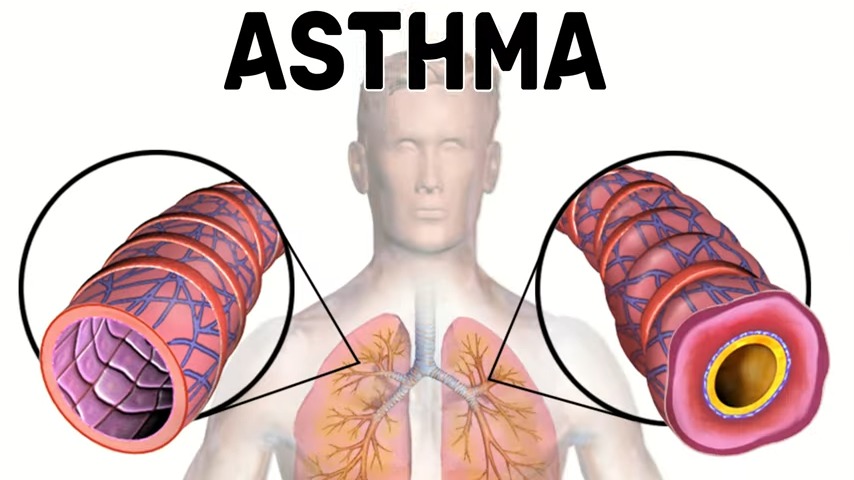Today’s article is an in-depth exploration of managing asthma, a respiratory condition that affects both children and adults. According to the World Health Organization (WHO), nearly 2.6 billion asthma patients were supported globally in 2019. This detailed Article aims to clarify any confusion you might have about this condition.
What is Asthma?
Asthma is a chronic condition where the airways become inflamed and narrow, making it difficult for air to pass through to the lungs. When air travels through the nose and into the airways, these tubes can become swollen and produce mucus, which leads to obstructed airflow and difficulty breathing. This narrowing of the airways is what characterizes asthma.
Identifying Asthma
Recognizing asthma symptoms is crucial for effective management and treatment. Key symptoms include:
- Wheezing: A whistling sound when breathing, especially when exhaling.
- Coughing: Asthma-related coughs often occur in the evening or early morning.
- Shortness of Breath: Difficulty in breathing or a feeling of breathlessness.
- Other Symptoms: Excessive mucus production, chest pain, frequent sneezing, a constantly blocked nose, and watery eyes are also common in maanaging asthma patients.
Causes of Asthma
Asthma can be triggered by a variety of factors, including:
- Allergies: External substances like dust, pollen, and smoke can provoke an immune system reaction.
- Cold Air and Exercise: Cold air or vigorous exercise can induce asthma symptoms, a condition known as exercise-induced asthma.
- Passive Smoking: Exposure to secondhand smoke, especially during pregnancy, is a significant risk factor.
- Air Pollution: Pollutants in the air, such as those from carpets and other household items, can trigger asthma.
- Pet Dander: Allergens from pets like cats and dogs can cause asthma symptoms.
- Cockroaches: These pests can also contribute to asthma through their waste and dead skin.
- Debunking the Cruciferous Vegetable and Thyroid Myth 2024
- Understanding and Addressing Heartburn Indigestion, and GERD
- Understanding Inconsistent Sharp Abdominal Pain, it’s Causes and Treatment
- Understanding Optic Atrophy, it’s Causes, Symptoms, and Treatment
- 8 Gym Machines That Could Be Harming Your Progress
- Things Nobody Tells You about Lower Belly Fat | Proven Tips for Fat Loss 2024
- How to Start Exercising: Essential Tips for Beginners
- How to Enhance Your Personality and Confidence through Exercise 2022
- Benefits of Exercise: Six Key Advantages You Need to Know 2024
Managing Asthma
Effective management of asthma involves both medication and lifestyle adjustments. Here are some strategies to consider:
- Identify Triggers: Understand what causes your asthma attacks and try to avoid these triggers.
- Medical History: Provide your doctor with detailed information about your condition and any recent changes in your environment or lifestyle.
- Regular Check-ups: Annual vaccinations and regular check-ups can help manage asthma effectively.
- Avoid Triggers: Stay away from known triggers like certain foods, allergens, or environmental factors.
Treatment Options
Treatment for asthma typically includes:
- Medications: These can help control inflammation and reduce symptoms. They are often administered through inhalers.

- Lifestyle Changes: Adjustments such as avoiding specific allergens or irritants can improve quality of life.
- Breathing Techniques: Techniques such as diaphragmatic breathing can help manage asthma symptoms effectively.
Common Misconceptions
It’s important to address some misconceptions:
- Asthma is Not a Cure-All: There is no single cure for asthma. It requires ongoing management and treatment.
- Children vs. Adults: While asthma in children often improves with age, asthma in adults typically requires long-term treatment and lifestyle changes.
Final Thoughts
Asthma is a serious condition that requires attention and care. By understanding its symptoms, causes, and treatment options, you can manage your condition more effectively. Remember, if you have any questions or need further clarification, feel free to comment below. Your feedback is valuable, and I’ll make sure to address it. Take care and stay informed!
Note: This blog post aims to provide general information about asthma. For personalized advice, please consult with a healthcare professional.
For traveling Tips And tricks, Click here








